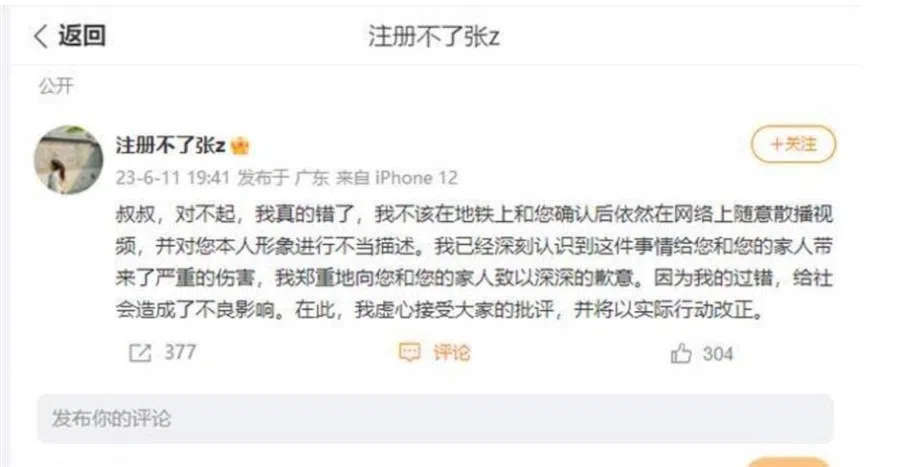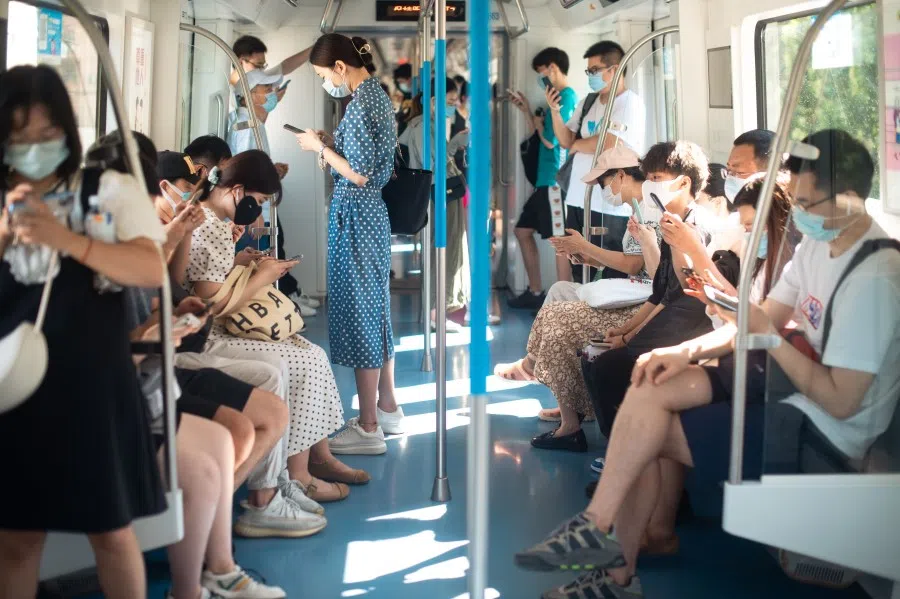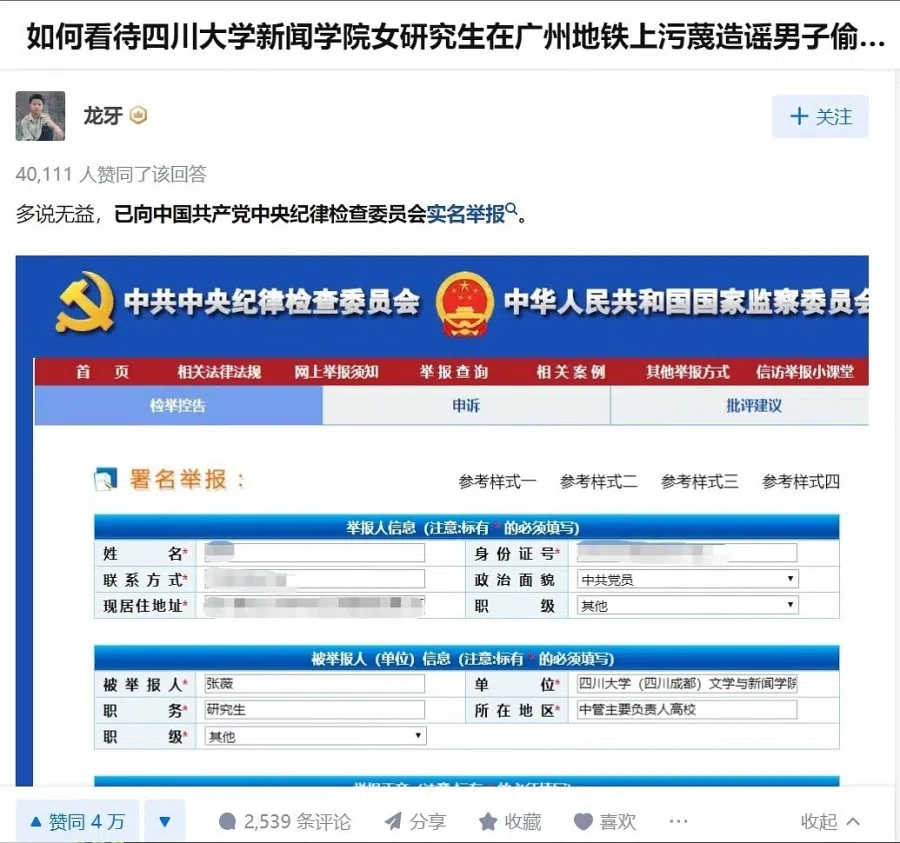Trial by Weibo: A young woman accuses a middle-aged man of voyeurism
Is being "sentenced to death" by online public trial going too far? What recourse is there when accusations are made that turn out to be false? Zaobao's China Desk looks into the Chinese phenomenon of going public with perceived injustices.

The case of a female university student accusing a middle-aged man of voyeurism on the subway has been swirling online in China for days.
The incident started on 7 June, when a woman suspected she was being secretly filmed on the Guangzhou subway, and demanded to inspect the man's phone. But even after he showed her his phone to prove his innocence, the woman went on Weibo describing her encounter with a "creepy man", posting photos and videos.
She described how she had "safeguarded her rights" on the subway, referring to the man as a "creepy old man" who was "well-practised" and "not a first-time offender". While she received some support, many netizens questioned why she exposed the man if she wasn't actually being filmed.
Soon after, the woman deleted her post, but the videos had already been widely circulated. Mr Deng, the man's son, discovered his father's photos online and reported the incident at the Lujiang Police Station in Guangzhou on 11 June, demanding an apology from the woman. The woman apologised to the man's family and also posted a public apology on Weibo that same evening, expressing deep remorse for the harm caused by the incident.
Mr Deng said: "She is still a student. A public apology is enough. I don't want it to affect her too much."

While the Dengs chose to forgive her, Chinese netizens were not ready to do so. They dug into her personal information and discovered her identity as a Chinese Communist Party (CCP) member. They reported her to the disciplinary committee and supervisory commission of the CCP and posted screenshots of the reports.
Sichuan University, where the woman is currently enrolled, has stated that it is cooperating with the police investigation. Tencent, the company where she was interning, is also thought to have terminated her internship contract under public pressure. The topic resurfaced on the list of top searches on 13 June.
...it was only after the middle-aged man's family reported her, and netizens reported her actions to her school, the disciplinary committee and the Ministry of Education that she "gave in" and changed her attitude completely.
Where does such overwhelming anger come from?
It is apparent that the anger from Chinese netizens towards this young woman was built up bit by bit as the event unfolded and her personal information was gradually revealed.
The first trigger was at the start when she vilified someone and exaggerated claims of voyeurism that never happened, thereby making false accusations.
The second affront was when the female student adamantly refused to apologise, stating that as a "graduate student", she did not need netizens to educate her - it was only after the middle-aged man's family reported her, and netizens reported her actions to her school, the disciplinary committee and the Ministry of Education that she "gave in" and changed her attitude completely. Netizens believe that an insincere apology is unacceptable.

The third escalation was when people discovered that the "well-practised, creepy old man" she described was actually a 56-year-old migrant worker in Guangzhou, who couldn't work that day due to rainy weather. In contrast, the woman is a graduate student at Sichuan University, admitted through recommendation from Henan University's School of Journalism and Communication; a student cadre who is said to have frequently skipped classes; a Douyin personality with 80,000 followers; and an intern at the big tech company Tencent.
Netizens feel that compared to the simple, non tech-savvy middle-aged man, this glamorous and prominent woman was not the weaker party. One netizen commented: "How is this defending rights? She is clearly a self-serving egoist, bullying an innocent person who has nothing."
Netizens reported her on the website of the Central Commission for Discipline Inspection (CCDI) and the Ministry of Education, demanding an investigation into how she was "recommended for graduate studies", and why she had repeatedly skipped classes without punishment. They also called for the revocation of her student status and party membership at Sichuan University's graduate school.
Some clamoured: "It would be terrible if someone who studies at a school of journalism, who's a potential media person, is relying on subjective speculation for broadcasting!" and "Her party membership should be revoked as soon as possible!"
State media calls for calm and lawful handling
While netizens are calling for stronger administrative penalties, media and legal professionals are urging calm and lawful handling of the situation.
Lawyer Zhang Yonghui from Handing Law Firm in Zhejiang feels that falsely accusing someone of voyeurism does not constitute the crime of false accusation, but rather comes under the civil liability of infringement - specifically, infringing on the middle-aged man's reputation.
According to the Civil Code, the infringement must be ended, the impact eliminated, apologies made, and compensation paid. The female college student has already deleted the videos and publicly apologised; if the other party does not pursue economic compensation, the student does not need to face further penalties.
Former media professional Hu Xijin also said on Weibo that young people should be given a chance to correct their mistakes, with legal consequences determined in accordance with the law.

A report by Chinese state media CCTV News quoted analyses by lawyers saying that whether it is online harassment or suspected voyeurism, there are legal avenues for resolution.
One lawyer said if one believes their legal interests have been violated in a public place, they should first approach staff members to report the situation, and let a third party investigate, collect, and preserve evidence, and then decide whether to file a lawsuit or report the incident to the authorities.
...a female student from Hangzhou Normal University spoke to her adviser about harassment and suspected voyeurism by a classmate, to no avail.
Where does the instinct to go public come from?
However, there are still many instances where individuals choose to go public rather than seek assistance from relevant personnel.
This approach can sometimes be effective. On 13 June, two cases related to "voyeurism" came up on Weibo's trending topics. In one instance, a female student from Hangzhou Normal University spoke to her adviser about harassment and suspected voyeurism by a classmate, to no avail. As a result, the student's family posted chat records with the adviser online to prove that her classmates had been harassing her.
A recent incident of a "rat head" found in canteen food at Jiangxi Industry Polytechnic College, which was soon debunked as a duck's head, was triggered by a netizen posting a photo online, which sparked debate and led to subsequent public supervision and investigation.
Chinese society has developed an instinct to go public with any injustice, even without verifying the facts...

In such cases, people rely on the power of the masses to get justice for themselves, which also includes an element of public trial.
To be fair, in this we-media era, it is common practice to post injustices online. However, over the long term, Chinese society has developed an instinct to go public with any injustice, even without verifying the facts; this may create a mentality where anything posted publicly is considered a case of injustice.
And in the age of the internet, it seems that anyone who can voice their opinions on social media has the power to put others on trial.
But in reality, to uphold justice, just going public is not enough, nor is public trial the best way to judge. What is needed is a clear and professional investigation of the facts, in order to find the truth and move from the deadlock of "he said, she said" to a resolution. These investigations require the involvement of impartial and professional departments, and the police and authorities should play their roles. Of course, their intervention has to be based on public trust.
If professional agencies and public authorities inspire more confidence and are not frequently absent, and if issues are no longer only resolved by making a fuss, society will become much more civilised.
The young woman involved in the false accusation studies at a school of journalism. Her first reaction was to leverage the power of media and public opinion, which is probably a stronger instinct for her than for most people. However, in setting off the public trial of the middle-aged Mr Deng with no evidence proving his voyeurism, she herself ultimately became a victim of an online public trial.
She probably did not expect any of this, which shows that the trend of online public trials should not be encouraged, and everyone should be wary. If professional agencies and public authorities inspire more confidence and are not frequently absent, and if issues are no longer only resolved by making a fuss, society will become much more civilised.
This article was first published in Lianhe Zaobao as "诬告地铁大叔偷拍事件,谁在审判".
Related: Who killed the girl? Chinese keyboard warriors seek justice online | Chinese netizens stand firm behind sexually abused 'adopted daughter' | Social protests in the era of affluence | When a dog of the privileged class in China bites a commoner | Will the 'most corrupt official in China' be sentenced to death? | Singaporean in China: The Chinese netizens speaking up for their fellow men | 'The world has abandoned me': Chinese women married into slavery?



![[Big read] When the Arctic opens, what happens to Singapore?](https://cassette.sphdigital.com.sg/image/thinkchina/da65edebca34645c711c55e83e9877109b3c53847ebb1305573974651df1d13a)
![[Video] George Yeo: America’s deep pain — and why China won’t colonise](https://cassette.sphdigital.com.sg/image/thinkchina/15083e45d96c12390bdea6af2daf19fd9fcd875aa44a0f92796f34e3dad561cc)
